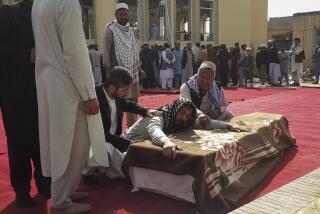Iran indicates it will join U.S. at Baghdad conference
TEHRAN — Iranian officials Wednesday signaled their willingness to participate in talks hosted by Iraq on the future of the war-torn nation, discussions that U.S. officials said this week they also would attend.
Iran’s chief nuclear negotiator, Ali Larijani, said Foreign Minister Manouchehr Mottaki had already received an invitation from the Iraqi foreign minister to participate next month in the talks.
Syria also has been invited to the conference, which is aimed at crafting a regional solution to Iraq’s growing sectarian violence. Iran and Syria both have been the target of a U.S. isolation policy.
Iran has long insisted that only a regional solution involving all of Iraq’s neighbors, along with the withdrawal of foreign forces, can end the violence. “If we find the conference in favor of the Iraqi nation, we will take part in it,” Larijani told reporters.
Larijani said he thought that attending talks in which the U.S. was involved would prove fruitful, even if it did not lead to a comprehensive dialogue with Washington or progress on negotiations over Iran’s nuclear program.
Trying to play down the U.S. role, he said, “Although we do not think that the presence of the U.S. is necessary in the conference, it is up to the Iraqi officials to decide about the participants.” The meeting is scheduled for March 10 in Baghdad, Iraqi officials said.
“Our hope is that this will be an ice-breaking attempt for maybe holding other meetings in the future. We want Iraq, instead of being a divisive issue, to be a unifying issue,” Iraqi Foreign Minister Hoshyar Zebari told Reuters news agency.
Abdul Karim Anzi, Iraq’s former minister of national security and a member of parliament from the Islamic Dawa Party who was meeting with Larijani in Tehran, lauded the role of Iran in the security and stability of Iraq.
“We have no shred of evidence of any Iranian role in interfering in Iraq’s domestic affairs,” he said, an apparent reference to U.S. claims that Iranian-made weapons have been used to kill U.S. soldiers in Iraq.
Larijani said the Dawa Party had been active in Iraqi politics and culture since former President Saddam Hussein rose to power. The Dawa was formed in Najaf in 1958 by clerics such as Mohammed Baqer Sadr and Mahdi Hakim to revive Islamic ideas among youth and to “fight atheism”-- meaning, at the time, both communism and Baathism.
More to Read
Sign up for Essential California
The most important California stories and recommendations in your inbox every morning.
You may occasionally receive promotional content from the Los Angeles Times.










